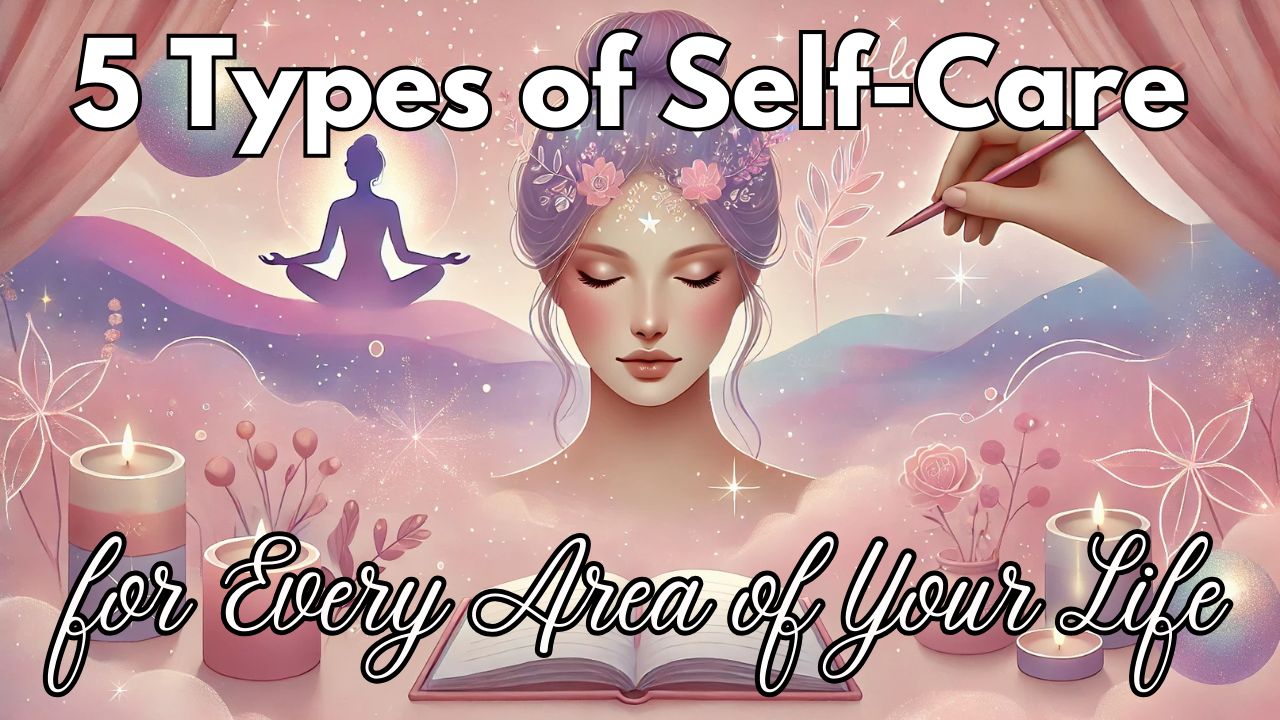5 Types of Self-Care for Every Area of Your Life: Nurturing Your Well-being
Self-care is not a luxury; it's essential for our lives. The World Health Organization sees its value in keeping us healthy and helping us deal with illness. It covers all parts of our well-being - physical, emotional, mental, spiritual, and social.
In today's fast world, it's easy to forget about self-love. But research shows that being kind to ourselves can lower stress and make life better. Whether you're a student or a working professional, self-care is for everyone.
This guide will show you five key self-care types. We'll help you make a plan that fits your life. You'll learn how to care for yourself through exercise, relationships, and finding purpose. Let's start this journey to a healthier, happier you!
Understanding the Importance of Self-Care
Self-care is key to keeping our lives in balance and avoiding burnout. It's about doing things that help our body, mind, and spirit. Let's dive into why self-care matters and how it can change our lives.
Defining Self-Care and Its Benefits
Self-care routines are actions we take to care for ourselves. They can be simple daily habits or more structured practices. The World Health Organization says self-care is about promoting health, preventing disease, and managing illness on our own.
- Reduced stress and anxiety
- Improved physical health
- Enhanced mental clarity
- Boosted self-esteem
- Better relationships
The Role of Self-Care in Preventing Burnout
Regular self-care is key to avoiding burnout. By doing stress-relief activities and mindfulness exercises, we can recharge and keep a healthy balance between work and life. This approach helps us avoid the exhaustion that comes from too much stress.
Overcoming Barriers to Self-Care
Many find it hard to make self-care a priority because of time or guilt. But, self-care is not selfish; it's essential for our well-being. By making small changes and adding self-care to our daily lives, we can beat these barriers and enjoy a healthier, more balanced life.
| Dimension of Wellness | Self-Care Activity |
|---|---|
| Physical | Regular exercise, balanced nutrition |
| Emotional | Journaling, talking to a friend |
| Mental | Reading, learning a new skill |
| Spiritual | Meditation, spending time in nature |
Physical Self-Care: Nurturing Your Body
Physical self-care is the base of a healthy life. It's about being kind and respectful to your body. This means eating right, staying active, and taking care of your health.
Eating well is essential. Choose meals that are good for you. Drink lots of water, aiming for your weight in ounces each day. Exercise regularly, aiming for 2-3 times a week, and do daily activities too.
Sleep is key for body acceptance and well-being. Aim for 7-9 hours each night. Don't sleep too much. Also, don't forget to see your doctor yearly for a check-up.
Healthy habits also mean less alcohol and less stress. Try activities like walking barefoot. These can help your body and mind.
| Physical Self-Care Practice | Recommended Frequency | Benefits |
|---|---|---|
| Exercise | 2-3 times per week | Improves fitness, mood, and energy levels |
| Hydration | Body weight in ounces daily | Supports bodily functions, skin health |
| Sleep | 7-9 hours nightly | Enhances recovery, cognitive function |
| Medical Check-ups | Yearly | Prevents health issues, ensures well-being |
Physical self-care isn't about being perfect. It's about making choices that respect your body. Start small and build habits that fit you. Your body will appreciate it!
Emotional Self-Care: Honoring Your Feelings
Emotional self-care is key for your well-being. It means knowing and dealing with your feelings, making strong connections, and setting good boundaries. By focusing on emotional self-care, you can handle life's ups and downs better and find inner peace.
Recognizing and Processing Emotions
First, you must acknowledge your emotions. It's okay to feel sad, scared, or frustrated when things are uncertain. Don't hide these feelings. Let yourself feel them fully. This kindness to yourself helps you deal with stress and avoid burnout.
Building Healthy Relationships
Having strong, supportive friends is important for your emotional health. Be around people who truly accept and support you. These relationships give you a safe place to share your feelings and grow emotionally.
Setting Emotional Boundaries
Setting healthy boundaries is a big part of emotional self-care. It means learning to say no, respecting your limits, and clearly sharing your needs. By setting these boundaries, you protect your emotional energy and make room for self-care.
"The greatest discovery of my generation is that human beings can alter their lives by altering their attitudes of mind." - William James
Remember, emotional self-care is a journey. Be kind to yourself as you learn these skills. By valuing your feelings and focusing on your emotional needs, you're moving towards a more balanced and happy life.
Mental Self-Care: Stimulating Your Mind
Mental health self-care is key to feeling good. It helps keep your mind sharp and your emotions strong. Research shows that social workers who care for themselves are happier at work.
Positive self-talk is a great way to care for your mind. It can make you feel less stressed by up to 45%. This means talking kindly to yourself, replacing bad thoughts with good ones.
- Reading self-help books
- Learning new skills
- Engaging in intellectual games
- Practicing mindfulness meditation
Doing these things can make you feel 30% better. It's good to pick activities that you enjoy and that fit your life.
"The mind is not a vessel to be filled, but a fire to be kindled." - Plutarch
To see how well you're caring for your mind, use this table:
| Activity | Frequency | Impact (1-10) |
|---|---|---|
| Journaling | Daily | 8 |
| Puzzle solving | Weekly | 7 |
| Learning a new language | 3x per week | 9 |
| Gratitude practice | Daily | 10 |
By focusing on mental self-care, you can get smarter, feel less stressed, and grow as a person. A healthy mind leads to a happy life.
Types of Self-Care: A Complete Guide
Self-care is key to feeling whole and well. It covers many areas of our lives. Let's look at these types and how they help us stay healthy and happy.
Physical Self-Care Practices
Physical self-care is the base of our well-being. It includes regular exercise, eating right, and getting enough sleep. These habits boost our energy, strengthen our immune system, and improve our health.
Emotional Self-Care Strategies
Emotional self-care is about understanding and dealing with our feelings. It's about setting limits, being around positive people, and solving problems quickly. These steps help us stay emotionally balanced and build strong relationships.
Mental Self-Care Activities
Mental self-care keeps our minds active and growing. It's about learning new things, practicing mindfulness, and trying new experiences. These activities keep our minds sharp and strong.
Spiritual Self-Care Techniques
Spiritual self-care connects us to ourselves and the world. It can be meditation, spending time outdoors, or exploring our beliefs. These practices help us find our purpose and meaning in life.
Social Self-Care Methods
Social self-care is about caring for our relationships. It's about spending time with loved ones, joining groups, or helping others. These actions help us feel less alone and more connected.
| Type of Self-Care | Example Activities | Benefits |
|---|---|---|
| Physical | Exercise, healthy eating, sleep | Improved energy, better health |
| Emotional | Setting boundaries, positive relationships | Emotional balance, stress reduction |
| Mental | Learning, mindfulness, new experiences | Mental sharpness, personal growth |
| Spiritual | Meditation, nature walks, reflection | Sense of purpose, inner peace |
| Social | Quality time with others, community engagement | Stronger relationships, sense of belonging |
By adding these self-care types to our daily lives, we can take care of ourselves fully. Remember, self-care is not selfish. It's necessary for a balanced and fulfilling life.
Spiritual Self-Care: Connecting with Your Inner Self
Spiritual self-care is more than just religious practices. It's about caring for your soul and finding life's deeper meaning. By trying out different mindfulness techniques, you can get closer to your inner self.
Exploring Spirituality Beyond Religion
Spirituality isn't just about religious beliefs. It's about finding what truly connects with your soul. Activities like nature walks, art, or music can be spiritual. A study by Verywell Mind showed that 75% of people who practice spiritual self-care feel a deeper sense of life's meaning.
Meditation and Mindfulness Practices
Meditation is a great way to grow spiritually. Just 5-10 minutes of meditation each day can cut anxiety by 30% and boost self-awareness by 25%. Start with guided meditations or simple breathing exercises.
Finding Purpose and Meaning
Finding your life's purpose is a big part of spiritual self-care. Journaling can make you more emotionally intelligent by 35% and better at solving problems by 20%. Use journal prompts to explore your values, passions, and goals.
| Spiritual Self-Care Practice | Benefit | Impact |
|---|---|---|
| Nature Walks | Stress Reduction | 20% decrease |
| Daily Gratitude | Overall Happiness | 50% increase |
| Community Connection | Mental Health | 30% improvement |
Try these spiritual self-care practices to care for your inner child and grow personally. Remember, everyone's journey to spiritual well-being is unique. Experiment with different techniques to find what works best for you.
Social Self-Care: Cultivating Meaningful Connections
Social self-care is key to our well-being. It helps us build strong relationships and stay healthy. Studies show that good social ties can lower risks of heart disease, depression, and even death.
The U.S. Surgeon General calls loneliness a major health issue. Feeling alone is as bad as smoking 15 cigarettes a day. We must focus on social well-being in our daily lives.
"Investing in social connections is vital for fighting loneliness and boosting society's health."
Here are ways to boost your social self-care:
- Make time for friends and family
- Join groups or clubs that interest you
- Volunteer to meet new people
- Listen well to deepen relationships
- Set boundaries for healthy relationships
Using these strategies can create a strong support network. It improves your life quality. Remember, making meaningful connections is vital for a healthy life.
| Social Connection Benefits | Impact on Health |
|---|---|
| Strong social ties | 50% increased likelihood of survival |
| Positive social interactions | Boosted immune system |
| Robust family support | Decreased risk of depression |
| Social support network | Improved adoption of healthy habits |
By focusing on social self-care, you help yourself and society. Start today by calling a friend or joining a group. Your future self will be grateful.
Creating a Personalized Self-Care Plan
Making a self-care plan that fits you is essential for your well-being. It's about knowing what you need and adding self-care to your daily life. Let's look at how to make a plan that helps with personal growth and balancing work and life.
Assessing Your Individual Needs
First, look at your lifestyle and see where you need help. The Lifestyle Behaviors assessment can show you how to manage stress. The Self-Care Assessment can reveal what you're already doing and what you might need to work on. These tools help you understand what you need for self-care.
Setting Realistic Self-Care Goals
Once you know what you need, set goals that are reachable. Focus on your mind, body, and spirit. Set both short and long-term goals that help with your personal growth. For example, you might want to start exercising regularly or find a better balance between work and life.
Integrating Self-Care into Daily Life
Make self-care a part of your daily routine. Use the My Maintenance Self-Care Worksheet to find activities that you enjoy. Remember, self-care is about meeting your needs, not just wants. Be kind to yourself as you start these new habits.
| Self-Care Area | Activity | Frequency |
|---|---|---|
| Physical | 30-minute walk | Daily |
| Mental | Mindfulness meditation | 3 times per week |
| Emotional | Journaling | Weekly |
| Social | Coffee with a friend | Bi-weekly |
Keep track of how you're doing and change your plan if needed. Share your goals with friends or family for support. Remember, taking care of yourself first helps you care for others better and make a positive impact on society.
Overcoming Self-Care Challenges
Self-care isn't always easy. Many people face hurdles when trying to prioritize their well-being. Time constraints, guilt, and misconceptions about self-care being selfish top the list of common obstacles. But fear not! With the right mindset and strategies, you can overcome these challenges and make self-care a natural part of your routine.
| Challenge | Solution |
|---|---|
| Limited Time | Practice time management. Schedule short stress-relief activities throughout your day. |
| Feelings of Guilt | Embrace self-compassion practices. Remember, taking care of yourself isn't selfish - it's necessary. |
| Financial Constraints | Explore free or low-cost self-care options like meditation, walking, or journaling. |
| Lack of Knowledge | Educate yourself on various self-care techniques. Start with simple activities and gradually expand. |
Remember, self-care isn't one-size-fits-all. It's about finding what works for you. Start small, be patient with yourself, and gradually incorporate self-care into your daily life. Your mind and body will thank you!
"Self-care is not a luxury. It's a necessity for maintaining balance and well-being in our lives."
By addressing these challenges head-on, you'll be better equipped to nurture your physical, emotional, and mental health. Stay committed to your self-care journey, and watch as it transforms your life for the better.
Conclusion: Embracing a Holistic Approach to Self-Care
Self-care is more than just a trend; it's essential for our well-being. With 75% of people stressed at work, it's key to find different ways to care for ourselves. This includes physical activities like exercise and emotional practices like mindfulness.
Starting a self-love journey can be tough. Even though 80% focus on their physical health, only 50% engage in mental activities outside work. This shows we need to care for all parts of our lives, not just one.
True self-care is more than just daily habits. It's about building a supportive circle, fostering positive connections, and asking for help when needed. By embracing self-care in all its forms, we improve our resilience and overall happiness. Let's keep working on caring for ourselves.

P.S. Whenever you’re ready, I would love to support you on your journey! There are currently 6 main ways Meraki Daydream can help you:
#1: Gratitude Journal Freebie:
Gratitude is the foundation of your mindful living journey. If you’re ready to start your daily gratitude practice, grab your free gratitude journal here.
#2: Shop Meraki Daydream for Intentional Fashion and Accessories:
Are you ready to channel your inner goddess and feel confident and empowered while turning daily activities into magical rituals?
#3: Manifestation Magic Potion Guide + Rituals:
If you’re confused by all the tips and tricks floating around the internet about manifestation, and you tried most of them with no results, this is for you.
In this guide, we demystify and debunk common manifestation myths and give you actionable instructions to help you actually achieve success on your manifestation journey.
#4: Spirituality and Self-Love Membership Community:
Tired of not seeing success on your spirituality, self-love and personal growth journey?
Join our spirituality and self-love membership where you can interact with an amazing community of like-minded people, and gain access to practical, actionable resources that have actually been helpful and effective for facilitating internal and external transformation on my personal journey.
#5: Mindful Business Membership Community:
Is your business putting you on the fast-track to burnout? The vibrant, growing community of like-minded people and the large array of actionable resources ensure that you have everything you need to be kind to yourself while growing your business sustainably.
Join our mindful business membership if you’re an entrepreneur who wants to adopt a more effective, but less exhausting approach to professional life.
#6: VIP Support in Both Memberships:
For each membership, you will be given the option to access VIP support, where I, Vansa, will personally assist you and give you feedback and guidance on your individual journey in an interactive group chat.
Just head over to the relevant membership and select the VIP option that suits you best.
Source Links
- 5 Types of Self-Care for Every Area of Your Life - https://www.verywellmind.com/self-care-strategies-overall-stress-reduction-3144729
- 6 Types of Self-Care and Why You Need Them All - https://greatist.com/health/types-of-self-care
- What is Self-Care and Why is it Important For You? - https://www.snhu.edu/about-us/newsroom/health/what-is-self-care
- Self-Care Is a Trendy Buzzword, but What Exactly Is It? - https://www.verywellhealth.com/what-is-self-care-5212781
- The 7 Different Types of Self Care and Why They’re Important - Jenn Drummond - https://jenndrummond.com/blog/the-7-different-types-of-self-care-and-why-theyre-important/
- 12 Self-Care Tips for Nurturing Your Body - Families for Depression Awareness - https://www.familyaware.org/12-self-care-tips-for-nurturing-your-body/
- 7 Types of Self-Care & Why You Need Them - https://www.healthcoachinstitute.com/articles/7-types-of-self-care/
- How to practice emotional self-care - https://www.uchealth.org/today/how-to-practice-emotional-self-care/
- Self-Care & Feeling Your Feelings — Blog - https://www.selfcarewithgracy.com/blog/selfcareandfeelingyourfeelings
- 7 Types of Self-Care and Why You Should Practice Them - https://onlinesocialwork.vcu.edu/blog/types-of-self-care/
- Self-Care Resources - https://mentalhealth.ucdavis.edu/resources/self-care
- The 8 Forms of Self-Care & How You Can Practice Them — Anchor Therapy, LLC - https://www.anchortherapy.org/blog/the-8-forms-of-self-care-how-you-can-practice-them-hudson-county-nj-jersey-city-hoboken-weehawken-therapists
- 4 Key Dimensions Of Self-Care - https://ctrinstitute.com/blog/4-key-dimensions-self-care/
- 8 Types of Self-Care for Better Mental Health – Dauntless Counseling - https://dauntlesscounseling.com/self-care-for-mental-health/
- Self-Care Series (Part 3) – Oregon Counseling - https://oregoncounseling.com/article/self-care-series-part-3-spiritual-self-care/
- What is Self-Care? Practical Advice and Tips - https://granitehillshospital.com/blog/what-is-self-care-practical-advice-and-tips/
- Spiritual Self-Care | Sarah's Self-Care Corner - https://sites.psu.edu/shkrcl1/2022/03/15/spiritual-self-care/
- Why You Must Add Social Connection to Your Self-Care Routine - https://www.psychologytoday.com/us/blog/how-to-grow-hope/202309/why-you-must-add-social-connection-to-your-self-care-routine
- Your Social Self: Building Healthy Relationships - https://grokker.com/mind/self-care/program/your-social-self-building-healthy-relationships/6290001e09572b3df48d1a3a
- Self care Practices Social Connections: Cultivating Community: The Impact of Social Connections on Self care - FasterCapital - https://fastercapital.com/content/Self-care-Practices-Social-Connections--Cultivating-Community--The-Impact-of-Social-Connections-on-Self-care.html
- Developing Your Self-Care Plan - https://socialwork.buffalo.edu/resources/self-care-starter-kit/developing-your-self-care-plan.html
- Personalized self-care plans - Distress Centre - https://distresscentre.com/2021/01/27/how-to-create-your-own-personalized-self-care-plan-step-by-step-guide/
- Overcoming the Top 3 Challenges to Self-Care - https://commonslibrary.org/overcoming-the-top-3-challenges-to-self-care/
- 30 Day Guided Self-Care Challenge for Improved Mental Health - Alfrey and Pruitt Counseling - https://alfreyandpruittcounseling.com/30-day-guided-self-care-challenge-for-improved-mental-health/
- Overcoming Barriers to Self-Care - Psychologist Gold Coast - CBT Professionals - https://cbtprofessionals.com.au/overcoming-barriers-to-self-care/
- Self Care From a Holistic Point of View — Perspectives Holistic Therapy - https://www.perspectivesholistictherapy.com/blog/holistic-self-care
- Self-Care: Beyond Routines and Embracing a Holistic Lifestyle - https://www.pinkpositivepsychology.com/post/self-care-beyond-routines-and-embracing-a-holistic-lifestyle




 https://merakidaydream.com/pages/about-us
https://merakidaydream.com/pages/about-us

分享並獲得 15% 折扣!
只需在以下社交網路之一上分享此產品,您就可以享受 15% 的折扣!